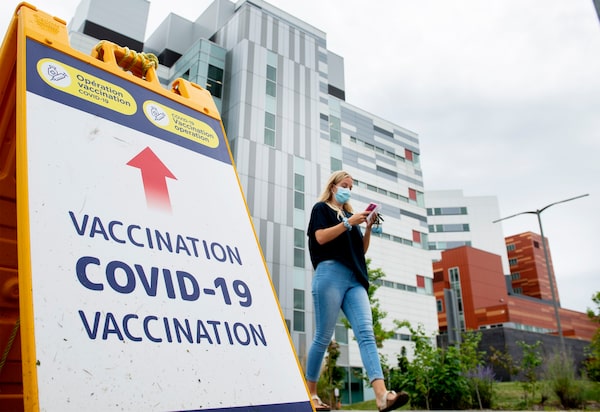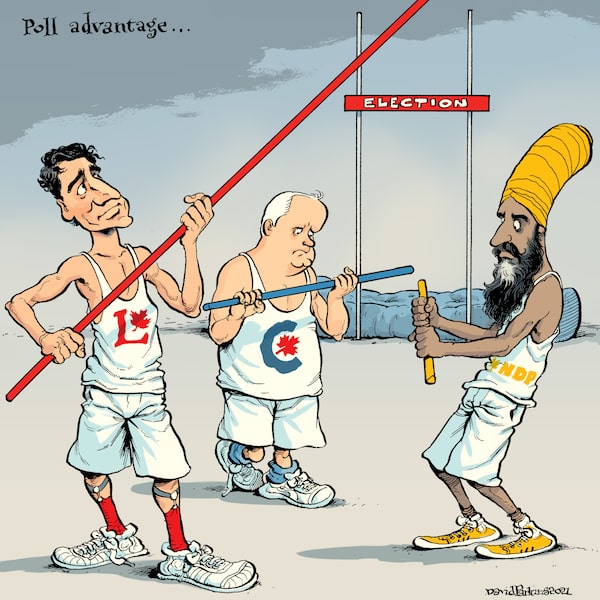Good morning,
In response to a rise in COVID-19 cases and hospitalizations, Quebec Premier François Legault said yesterday that the province will begin to require proof of immunization for some activities in September. Modelling from the Public Health Agency of Canada last week showed that more than 80 per cent of people 12 and older will need to be twice vaccinated to prevent hospitals from being overwhelmed in the fall as the highly transmissible Delta variant spreads. As of yesterday, 81.5% of eligible Canadians aged 12 and over have received at least one dose of vaccine and 69.2% have been fully vaccinated.
“The principle behind the passport is that those who made the effort to get their two doses must be able to live a quasi-normal life,” Mr. Legault said. “It’s an important message we have to convey … vaccines work.”
Ontario Premier Doug Ford and Alberta Premier Jason Kenney have both said no to vaccine passports while British Columbia, New Brunswick, Northwest Territories, and Nova Scotia are all considering them. Quebec will join only Manitoba, whose immunization card launched in June.

A woman wears a face mask as she walks by a COVID-19 vaccination sign in Montreal, Sunday, August 1, 2021, as the COVID-19 pandemic continues in Canada and around the world.Graham Hughes/The Canadian Press
This is the daily Morning Update newsletter. If you’re reading this on the web, or it was forwarded to you from someone else, you can sign up for Morning Update and more than 20 other Globe newsletters on our newsletter sign-up page.
First flight of Afghans to Canada a ‘relief’ but advocates say more needs to be done faster
After months of pressure to provide assistance to Afghan nationals who were employed either by the Canadian military or Canadian diplomats in Afghanistan, the federal government announced a program to resettle them in Canada. The first planeload of what is expected to be thousands of Afghans arrived on Wednesday, but for those who remain in the country, their relationship with Canada now puts them in potential danger.
The U.S. is withdrawing its troops and the Taliban is gaining territory, putting those who worked with foreign countries at risk of reprisals from the hard-line Islamist group. Andrew Rusk, co-founder of Not Left Behind, an organization made up of veterans and families of veterans who advocated for government action on this issue, said that he is “relieved” Afghans are beginning to arrive in Canada. But he added that he’s very concerned that the resettlement process may not be moving quickly enough, and that certain deserving people may be excluded.
Some Afghan interpreters had been resettled in Canada years before the new program was announced, he said, and now there is uncertainty over whether they will be able to use the new expedited process to bring over family members who are still in Afghanistan.
Got a news tip that you’d like us to look into? E-mail us at tips@globeandmail.com Need to share documents securely? Reach out via SecureDrop
Nike’s ‘super shoes’ prompt a revolution on the track and in the marathon
Since the Summer Games of 2016, nearly every road-running record has been demolished by someone wearing a super shoe made by Nike. The five-year technological project has reached its peak at the Tokyo Olympics, as the controversial marathon shoes, which will dominate each of the women’s and men’s start lines, are on display alongside new track footwear in the 100-metre and 10,000-metre events.
Some contend the shoes – defined by a curved carbon plate and chunky midsole made of a proprietary compound called Pebax – provide an unfair advantage.
Others say Nike is at the forefront of a long-overdue revolution in running that has injected new excitement into a historically conservative sport.
Are the super shoes a form of mechanical doping or the inevitable result of technological innovation? Read the story by Michael Doyle and decide for yourself.
Get the latest on everything happening on and off the field in Tokyo with our Daily Olympic guide and subscribe to our Olympics newsletter featuring original stories from Globe reporters in Canada and Tokyo, tracking Team Canada’s medal wins, and looking at past Olympic moments from iconic performances.
ALSO ON OUR RADAR
Hong Kong’s Independent Commission Against Corruption is falling out of favour: After conducting a series of investigations that seem more motivated by politics than by any desire to stamp out graft, the commission’s reputation is increasingly shaky writes The Globe’s Asia correspondent James Griffiths from Tokyo.
Japan’s skateboarding medal haul may inspire new riders, but is up against a resistant public: At the Tokyo Olympics, Japanese skaters dominated the discipline the way Jamaicans have dominated sprinting. Now, Japan needs to sort out what to do with the attention the sport has received.
China’s Ministry of Foreign Affairs files a formal complaint with the BBC: A ministry spokesperson said the broadcaster produced “twisted and groundless reporting” on recent flooding in the central Chinese province of Henan and “fake news time and again.”
The latest in the Meng Wanzhou, Huawei trial: The U.S. alleges Ms. Meng committed fraud by lying in a PowerPoint presentation in 2013 to her Hong Kong bankers, but her legal team says the U.S. Justice Department is attempting to mislead Canada.
Ontarians react to news of school sports’ return: It’s a mix of elation and concerns for students and coaches, some who’ve missed more than a year of activities that play a formative role in their young lives, others worried about potential for COVID-19 spread.
MORNING MARKETS
Markets await U.S. jobs report as stocks, FX dip on Delta jitters: Stocks and emerging markets currencies edged down on Friday and oil headed for its biggest weekly loss since March, as nervousness over the spread of the COVID-19 Delta variant hit risk assets and crimped demand. A key jobs report due later in the day is expected to deliver further signs of growth in the United States, soothing some of those concerns about the global economy and further boosting the rising dollar.
WHAT EVERYONE’S TALKING ABOUT
Damian Warner wins gold in men’s decathlon at Tokyo, sets Olympic record
“For a gifted athlete, choosing decathlon makes no sense. There are too many things to learn and not enough time or physical capacity to learn them. You won’t make real money.” - Cathal Kelly
The U.S. and China aren’t ready to call it quits just yet
“China needs to realize that acting responsibly on global matters is what is expected of a major power, and not a chip for bargaining.” - Frank Ching
Canada’s health-care workers need to be held to a higher standard on vaccines
“The time has come for health-care organizations to show even bolder leadership by requiring that all staff be vaccinated to protect their patients.” - Michel Haddad
Justin Trudeau is about to call an unneeded pandemic election. The least he can do is help make it a safe one
“Achieving that turnout will mean providing thousands of polling places with good ventilation and proper physical distancing, plus plenty of opportunities to cast ballots in advance polls or by mail.” - The Globe Editorial Board
In Pope Francis’s Vatican, alleged financial misconduct is now a cardinal sin
“What Pope Francis still needs to get a handle on is the byzantine complexities of Vatican finance.” - Michael W. Higgins
TODAY’S EDITORIAL CARTOON

David Parkins/The Globe and Mail
LIVING BETTER
Personal finance tips for athletes to consider
Athletes can’t always pay the bills with picture-perfect finishes and personal bests, so Tim Cestnick shares some financial advice for Canada’s current and future best.
For medal-winning athletes, the Canadian Olympic Committee’s Athlete Excellence Fund awards $20,000 for each gold medal, $15,000 for each silver, and $10,000 for each bronze, but unlike lottery winnings, the money is taxed. Cestnick suggests creating an Amateur Athletic Trust, setting up a formal trust or paying a young athlete in your family wages as ways to ease the financial load for the country’s future Olympians.
MOMENT IN TIME: AUGUST 06, 1995

Donovan Bailey of Canada, wins the final of the men's 100-metre event at the 1995 IAAF World Championships on August 6, 1995, at the Ullevi Stadium in Gothenburg, Sweden.David Madison/Getty Images
Donovan Bailey becomes world’s fastest human in Sweden sprint
He didn’t set a world record or nab Olympic gold – both would come in Atlanta a year later – but when Donovan Bailey blazed across the finish line at the 1995 world athletics championship in 9.97 seconds, nosing out teammate Bruny Surin and Ato Boldon of Trinidad by 6/100ths of a second, he became the first Canadian to win the men’s 100-metre sprint at an international event since Ben Johnson’s steroidal fall from grace in 1988. Track had been “just a hobby-type thing” for Bailey until about 18 months earlier when he began training with the respected coach Dan Pfaff, who had told him he could be world-class if he were to take the sport seriously. On that momentous day in Gothenburg, Sweden, Bailey emerged awkwardly from the blocks, then caught the field at the 30-metre mark. Still, his form was off, and at 70 metres he yelled an obscenity to goad himself: a way, he explained later, “of getting some oxygen out and letting some more in.” To a country still rankled by Johnson’s shame, it was a breath of fresh air for all. - Simon Houpt
Read today's horoscopes. Enjoy today's puzzles.
If you’d like to receive this newsletter by e-mail every weekday morning, go here to sign up. If you have any feedback, send us a note.
Editor’s note: An earlier version of this article misidentified Alberta's premier. As well, the metrics used to identify the number of eligible Canadians vaccinated with one and two doses has been corrected.